|
CATEGORY: ANIMAL WELFARE — 05.MAR.2015
 Living on Earth
Living on Earth
The Federal Animal Killing Program —
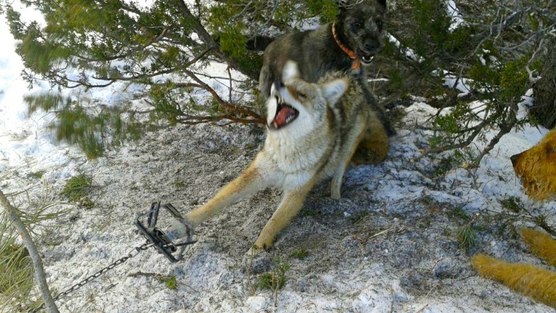 For more than a century, a US federal program called Wildlife Services has been operating in the shadows. Funded by a combination of private and taxpayer money, it has killed millions of animals. Amy Atwood of the Center for Biological Diversity says the slaughter is done with little oversight or regard for humane practices, and is usually done in service of private business interests rather than ecosystem needs.
For more than a century, a US federal program called Wildlife Services has been operating in the shadows. Funded by a combination of private and taxpayer money, it has killed millions of animals. Amy Atwood of the Center for Biological Diversity says the slaughter is done with little oversight or regard for humane practices, and is usually done in service of private business interests rather than ecosystem needs.
Go to page |
Download/listen
6:45
Original Show Pub Date: 27.Feb.2015
CATEGORY: LABOR RIGHTS, ANIMAL WELFARE — 21.FEB.2015
 Food Sleuth Radio
Food Sleuth Radio
How This Little Piggie Went to Market —
Ted Genoways discusses the devolution of the meatpacking industry through the lens of one of the biggest operators, Hormel. Topics include ... increasingly dangerous working conditions related to speeding up the "disassembly line"; the shift in labor force from white middle-class to immigrant lower-class as a way corporations could save money and have less trouble on safety complaints; antibiotic resistance; how companies skirt regulations on barn size; the industry push for ag-gag laws; other back-room political dealings that suit the wishes of the pork industry; water quality issues near hog operations. Genoways' book is The Chain: Farm, Factory, and the Fate of Our Food.
Go to page
Download/listen A
28:15
Download/listen B
28:15
Original Show Pub Date: 15.Jan.2015
CATEGORY: FOOD, ANIMAL WELFARE — 11.FEB.2015
 Diet Science
Diet Science
Pastured vs. Free-Range vs. Cage-Free vs. Organic Eggs—What's The Difference? —
Dee McCaffrey says the problems with conventional eggs range from low-quality feed to inhumane growing conditions. Organic eggs use better feed and have better growing conditions, but access to outdoors is sometimes more theory than practice in large organic operations. She rightly promotes eggs from backyard chickens as the best choice, with eggs from pastured chickens another good way to go.
Go to page |
Download/listen
10:53
Original Show Pub Date: 19.Jan.2015
CATEGORY: SPECIES — 23.DEC.2014
 NPR
NPR
Man's Last-Ditch Effort to Save the Northern White Rhino —
 A 44-year-old northern white rhino named Angalifu recently died of old age at the San Diego Zoo. Now only five animals remain in this subspecies, all in captivity. Four are females. The lone male lives in the Ol Pejeta Conservancy in Kenya. So it would seem the northern white rhino is doomed to extinction. Poachers are to blame — they've slain thousands of the rhinos to get their horns, which are hawked in Asia as a health tonic. But there may still be a way to bring back this 2-ton creature.
A 44-year-old northern white rhino named Angalifu recently died of old age at the San Diego Zoo. Now only five animals remain in this subspecies, all in captivity. Four are females. The lone male lives in the Ol Pejeta Conservancy in Kenya. So it would seem the northern white rhino is doomed to extinction. Poachers are to blame — they've slain thousands of the rhinos to get their horns, which are hawked in Asia as a health tonic. But there may still be a way to bring back this 2-ton creature.
Go to page |
Download/listen
3:01
Original Show Pub Date: 17.Dec.2014 ~~ Original story title: We're Down To 5 Northern White Rhinos: Is It Too Late For Babies?
CATEGORY: SPECIES, GENETIC ENGINEERING — 04.DEC.2014
 Quirks and Quarks
Quirks and Quarks
Genetically Modified Chestnuts —
A century ago, the American Chestnut was a tremendously important species in the forests of Eastern North America, representing more than a quarter of all forest trees in a swath from Georgia to Ontario. But a fungus introduced on imported Asian chestnut trees turned out to be catastrophic for the American Chestnut, killing billions of trees and essentially wiping out the species by the 1950s. Breeding a blight-resistant tree has proved laborious and difficult, so now a research team has developed a genetically modified American Chestnut that uses a gene from wheat to resist the effects of the fungus. Lead researcher William Powell explains.
Go to page |
Download/listen
10:08
Original Show Pub Date: 22.Nov.2014
CATEGORY: ENVIRONMENT (POLLUTION), SPECIES — 01.DEC.2014
 Quirks and Quarks
Quirks and Quarks
Lakes Turning to Jelly —
 The problem of acid rain is often touted as one of the few success stories in controlling pollution, as the industrial emissions that cause it have been cut substantially. But the environmental damage and disruption caused by acid rain still echo in the wilderness. One example discovered is the "jellification" of temperate lakes, where acid rain has reduced calcium content, an essential element for most lake organisms. This has caused some crustaceans at the base of the aquatic food chain—the ones that make their exoskeletons from calcium—to be at a disadvantage, and they're now being displaced by species that have a jelly-like coating. These jelly organisms are inedible to many predators and thus are disruptive to the lakes' ecological balance.
The problem of acid rain is often touted as one of the few success stories in controlling pollution, as the industrial emissions that cause it have been cut substantially. But the environmental damage and disruption caused by acid rain still echo in the wilderness. One example discovered is the "jellification" of temperate lakes, where acid rain has reduced calcium content, an essential element for most lake organisms. This has caused some crustaceans at the base of the aquatic food chain—the ones that make their exoskeletons from calcium—to be at a disadvantage, and they're now being displaced by species that have a jelly-like coating. These jelly organisms are inedible to many predators and thus are disruptive to the lakes' ecological balance.
Go to page |
Download/listen
10:43
Original Show Pub Date: 22.Nov.2014
CATEGORY: ENVIRONMENT, SPECIES — 23.OCT.2014
 Resistance Radio
Resistance Radio
Has Capitalism Captured the Environmental Movement? —
Tom Butler of the Northeast Wilderness Trust talks with Derrick Jensen about the problematic trend among mainstream environmental groups trying to steer capitalism in a better direction. The problem with that approach is that capitalists, when push comes to shove, will always prioritize corporate profits over natural preservation. Even more troubling is the shift in the framing of environmental issues, where the comfort, convenience, and continuation of modern life is a given, and any sacrifice along those lines to preserve species or protect the biosphere is not even up for discussion.
Download/listen
50:59
Original Show Pub Date: 19.Oct.2014
CATEGORY: SPECIES — 20.OCT.2014
 Living on Earth
Living on Earth
The Status of Japanese Whaling —
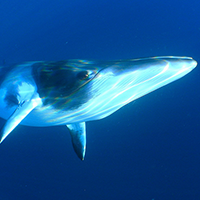 There’s a global moratorium on commercial whaling, but Japan continues to kill thousands under the guise of “research”. Dr. Phillip Clapham of NOAA's National Marine Mammal Laboratory discusses Japan's motives for this continued flouting of international rules, as well as the status of a number of whale species.
There’s a global moratorium on commercial whaling, but Japan continues to kill thousands under the guise of “research”. Dr. Phillip Clapham of NOAA's National Marine Mammal Laboratory discusses Japan's motives for this continued flouting of international rules, as well as the status of a number of whale species.
Go to page |
Download/listen
7:16
Original Show Pub Date: 17.Oct.2014
CATEGORY: ENVIRONMENT, SPECIES — 10.OCT.2014
 Living on Earth
Living on Earth
Obama Creates the World's Largest Ocean Reserve —
President Obama expanded the Pacific Remote Islands National Marine Monument, protecting nearly half a million square miles of Pacific Ocean from commercial exploitation. Elliott Norse of the Marine Conservation Institute talks about the impact of the reserve on the ecosystem and the precedent it sets for global conservation.
Go to page |
Download/listen
6:40
Original Show Pub Date: 03.Oct.2014
CATEGORY: SPECIES, ENVIRONMENT — 25.SEP.2014
 Living on Earth
Living on Earth
The Wilderness Act at 50 —
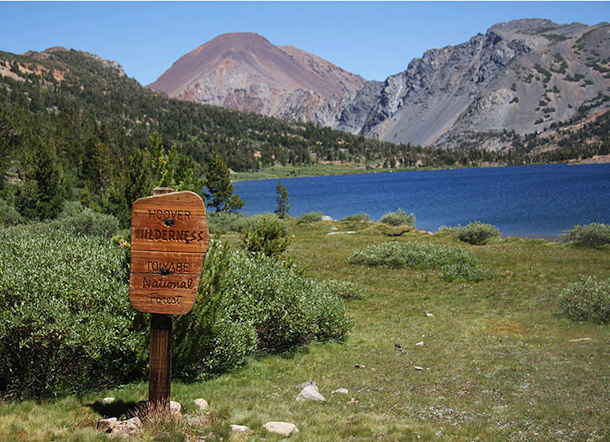 In 2014, the Wilderness Act turned 50. American environmental writer Jordan Fisher Smith discuss the relevance of the Wilderness Act today, as well as changing perceptions of wild lands, their uses, and how to protect them.
In 2014, the Wilderness Act turned 50. American environmental writer Jordan Fisher Smith discuss the relevance of the Wilderness Act today, as well as changing perceptions of wild lands, their uses, and how to protect them.
Go to page |
Download/listen
9:23
Original Show Pub Date: 12.Sep.2014
CATEGORY: SPECIES — 22.SEP.2014
 Resistance Radio
Resistance Radio
Sage Grouse Conservation as a Bellwether for Species Issues —
Erik Molvar is a wildlife biologist and directs WildEarth Guardians’ Sagebrush Sea Campaign. He discusses sage grouse conservation issues.
Download/listen
42:54
Original Show Pub Date: 31.Aug.2014
CATEGORY: ENVIRONMENT (WATER), SPECIES — 28.AUG.2014
 Resistance Radio
Resistance Radio
The Colorado River—Past, Present, and Future —
Gary Wockner coordinates the Save the Colorado River Campaign, whose mission is to protect and restore the Colorado River and its tributaries from the source to the sea. Topics include the history of the river; water rights and farms vs. cities; impact of dams and water rights on species; and opportunities for improving the river's future.
Download/listen
39:45
Original Show Pub Date: 24.Aug.2014
CATEGORY: SPECIES — 21.AUG.2014
 Resistance Radio
Resistance Radio
Sorry, Charlie—Fish Aren't So Dumb After All —
Animal behavioralist Culum Brown discusses the fascinating learning and memory aspects of fish ecology. Fish can remember and apply previous experiences to improve their success in areas such as food gathering and interactions with other species.
Download/listen
50:00
Original Show Pub Date: 10.Aug.2014
CATEGORY: SPECIES — 21.AUG.2014
 NPR
NPR
Glass-Free Menagerie New Zoo Concept Gets Rid Of Enclosures —
For animal lovers, zoos can be a mixed bag. It's amazing to be in shouting distance of magnificent wild animals, but it's hard not to get the feeling that great apes, big cats, and other creatures don't really love being behind bars, walls, and windows. Now, a Danish architectural firm is working with the Givskud Zoo and safari park in Denmark to eliminate the walls and create what they're calling Zootopia.
Go to page |
Download/listen
4:01
Original Show Pub Date: 09.Aug.2014
CATEGORY: ANIMAL WELFARE — 18.JUL.2014
 Democracy Now
Democracy Now
Animal Rights Activists Face Terrorism Charges for Freeing Minks from Fur Farm —
 The government has unveiled federal terrorism charges against two animal rights activists accused of helping to free minks and foxes from fur farms in rural Illinois. The prosecutors have accused Tyler Lang and Kevin Olliff of freeing about 2,000 mink from their cages on a fur farm and then removing parts of the fence surrounding the property so the mink could escape. Lang and Olliff have been indicted under the controversial Animal Enterprise Terrorism Act (AETA). Will Potter, who covers animal rights and environmental issues at GreenIstheNewRed.com, says the new statutes criminalize protests and civil disobedience: "This is really about a corporate campaign to demonize their opposition and to use terrorism resources to shut down a movement."
The government has unveiled federal terrorism charges against two animal rights activists accused of helping to free minks and foxes from fur farms in rural Illinois. The prosecutors have accused Tyler Lang and Kevin Olliff of freeing about 2,000 mink from their cages on a fur farm and then removing parts of the fence surrounding the property so the mink could escape. Lang and Olliff have been indicted under the controversial Animal Enterprise Terrorism Act (AETA). Will Potter, who covers animal rights and environmental issues at GreenIstheNewRed.com, says the new statutes criminalize protests and civil disobedience: "This is really about a corporate campaign to demonize their opposition and to use terrorism resources to shut down a movement."
Watch |
Download/listen
10:38
Original Show Pub Date: 15.Jul.2014
CATEGORY: ENVIRONMENT, SPECIES — 16.JUL.2014
 resistance Radio
resistance Radio
The Impact of Recreational Off-Road Vehicles —
Bethanie Walder, WildEarth Guardians Public Lands Director, discusses the impact of recreational off-road vehicles on non-motorized outdoor enthusiasts (hikers, campers, fishers, etc.) and on the environment and animals. Topics include history off off-road vehicles in parks, how NEPA applies, off-roaders as a vocal minority, the false "jobs vs. owls" argument in forestry decisions, rights vs. responsibilities.
Download/listen
48:21
Original Show Pub Date: 13.Jul.2014
CATEGORY: SPECIES — 07.JUL.2014
 Living on Earth
Living on Earth
WildLeaks Set to Catch Poachers —
WildLeaks is a new information-sharing platform that collects anonymous tips about wildlife poaching, illicit buying and selling of species, and illegal deforestation. Founder Andrea Crosta tells explains how WildLeaks is helping fight wildlife crime and prosecute the people involved.
Go to page |
Download/listen
5:51
Original Show Pub Date: 04.Jul.2014
CATEGORY: SPECIES, CLIMATE — 24.JUN.2014
 Uprising
Uprising
As Ocean Acidity Rises, Will Phytoplankton Health Fall? —
 Microscopic ocean creatures called phytoplankton produce an astonishing 60 percent of the Earth’s oxygen and they occupy the crucial bottom rung of our world’s ocean food chain. The survival of most life on this planet depends on healthy phytoplankton. Researcher William Cochlan discusses a new study that is attempting to predict the likely impact to phytoplankton from rising CO2 and ocean acidity levels. Though results are still unfolding, it appears that some phytoplankton turn more toxic in a higher acidity environment and, in turn, harm the shellfish and other marine animals that feed on them.
Microscopic ocean creatures called phytoplankton produce an astonishing 60 percent of the Earth’s oxygen and they occupy the crucial bottom rung of our world’s ocean food chain. The survival of most life on this planet depends on healthy phytoplankton. Researcher William Cochlan discusses a new study that is attempting to predict the likely impact to phytoplankton from rising CO2 and ocean acidity levels. Though results are still unfolding, it appears that some phytoplankton turn more toxic in a higher acidity environment and, in turn, harm the shellfish and other marine animals that feed on them.
Go to page |
Download/listen
21:06
Original Show Pub Date: 18.Jun.2014
CATEGORY: SPECIES — 19.JUN.2014
 Quirks and Quarks
Quirks and Quarks
Tree Swallows Have Winter of Discontent —
 Many species of birds that feed on airborne insects are in decline. Not only are their numbers diminishing, but the size of the remaining birds, particularly breeding females, has also been shrinking. Dr. Sebastien Rioux Paquette has been studying one of these birds, the tree swallow, in its summer habitat in Quebec. He's found that summer forage doesn't seem to be a problem for the swallows; the issue seems to be declines in insect prey in their wintering ground in the US and Mexico. Pesticides and shrinking habitat for insects due to agricultural intensification are depleting the swallows' winter food, and the birds are suffering as a result.
Many species of birds that feed on airborne insects are in decline. Not only are their numbers diminishing, but the size of the remaining birds, particularly breeding females, has also been shrinking. Dr. Sebastien Rioux Paquette has been studying one of these birds, the tree swallow, in its summer habitat in Quebec. He's found that summer forage doesn't seem to be a problem for the swallows; the issue seems to be declines in insect prey in their wintering ground in the US and Mexico. Pesticides and shrinking habitat for insects due to agricultural intensification are depleting the swallows' winter food, and the birds are suffering as a result.
Go to page |
Download/listen
8:34
Original Show Pub Date: 24.May.2014
CATEGORY: ENVIRONMENT, SPECIES — 09.JUN.2014
 Sea Change Radio
Sea Change Radio
A Wilderness Too Tame —
When was the last time you were really in the wilderness? Or, maybe you’re like the millions of Americans who’ve never even been in the wild before. Jason Mark, editor of Earth Island Journal, shares his misgivings about what he views to be a technological threat to some of nature's most mysterious spots. He says much of what we currently consider wild is actually pretty tame. Also discussed are conservation policy and the surprising number of bipartisan conservation bills that (unsurprisingly) have not yet been passed by Congress.
Go to page |
Download/listen
30:00
Original Show Pub Date: 20.May.2014
CATEGORY: GARDENING, BIODIVERSITY — 20.MAY.2014
 Food Sleuth Radio
Food Sleuth Radio
 The Nation's Largest Edible Landscape —
Alan Branhagen, Director of Horticulture at Powell Gardens in Kingsville, MO, talks about the concept of "complementary crops"—adding crops that help reduce pest problems on adjacent plants—and how to choose plants that attract pollinators and predator insects. His project known as the Heartland Harvest Garden has been dubbed the largest edible landscape in America.
The Nation's Largest Edible Landscape —
Alan Branhagen, Director of Horticulture at Powell Gardens in Kingsville, MO, talks about the concept of "complementary crops"—adding crops that help reduce pest problems on adjacent plants—and how to choose plants that attract pollinators and predator insects. His project known as the Heartland Harvest Garden has been dubbed the largest edible landscape in America.
Go to page |
Download/listen
28:15
Original Show Pub Date: 15.May.2014
CATEGORY: SPECIES — 08.MAY.2014
 The Colbert Report
The Colbert Report
E.O. Wilson on Ants, Dominion, Biodiversity, and Extinction —
 Stephen Colbert thumps his Bible and—true to his funny, faux right-wing character—asks E.O. Wilson to explain why man's dominion over the beasts should not be paramount, even if it means extinction. Tut, tut, explains Wilson; in the end, the ants win.
Stephen Colbert thumps his Bible and—true to his funny, faux right-wing character—asks E.O. Wilson to explain why man's dominion over the beasts should not be paramount, even if it means extinction. Tut, tut, explains Wilson; in the end, the ants win.
Watch |
Download/listen
6:02
Original Show Pub Date: 05.May.2014
CATEGORY: SPECIES — 24.APR.2014
 Living on Earth
Living on Earth
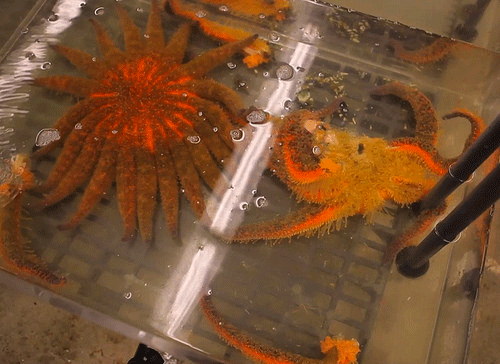 Mysterious Disease Attacking West Coast Sea Stars —
A strange malady is infecting many species of starfish up and down the US west coast. It causes lesions and incites the sea stars to rip themselves apart. Katie Campbell reports on the biologists who are trying to unravel what's going on with this macabre mystery.
Mysterious Disease Attacking West Coast Sea Stars —
A strange malady is infecting many species of starfish up and down the US west coast. It causes lesions and incites the sea stars to rip themselves apart. Katie Campbell reports on the biologists who are trying to unravel what's going on with this macabre mystery.
Go to page |
Download/listen
4:55
Original Show Pub Date: 11.Apr.2014
CATEGORY: ENERGY, SPECIES — 23.APR.2014
 Living on Earth
Living on Earth
Hydropower Overload In China —
 For the past 65 years, China has built nearly two dams per day, and wants to expand its hydroelectric capacity. Jennifer Turner, director of the China Environment Forum, explains how China's plan to ramp up dam installation in Yunnan Province raises the risks for this biodiversity hotspot in Southwest China, and how hydro power in China is often paired with coal power.
For the past 65 years, China has built nearly two dams per day, and wants to expand its hydroelectric capacity. Jennifer Turner, director of the China Environment Forum, explains how China's plan to ramp up dam installation in Yunnan Province raises the risks for this biodiversity hotspot in Southwest China, and how hydro power in China is often paired with coal power.
Go to page |
Download/listen
6:46
Original Show Pub Date: 11.Apr.2014
CATEGORY: ANIMAL WELFARE — 08.APR.2014
 Living On Earth
Living On Earth
International Court Saves Whales (?) —
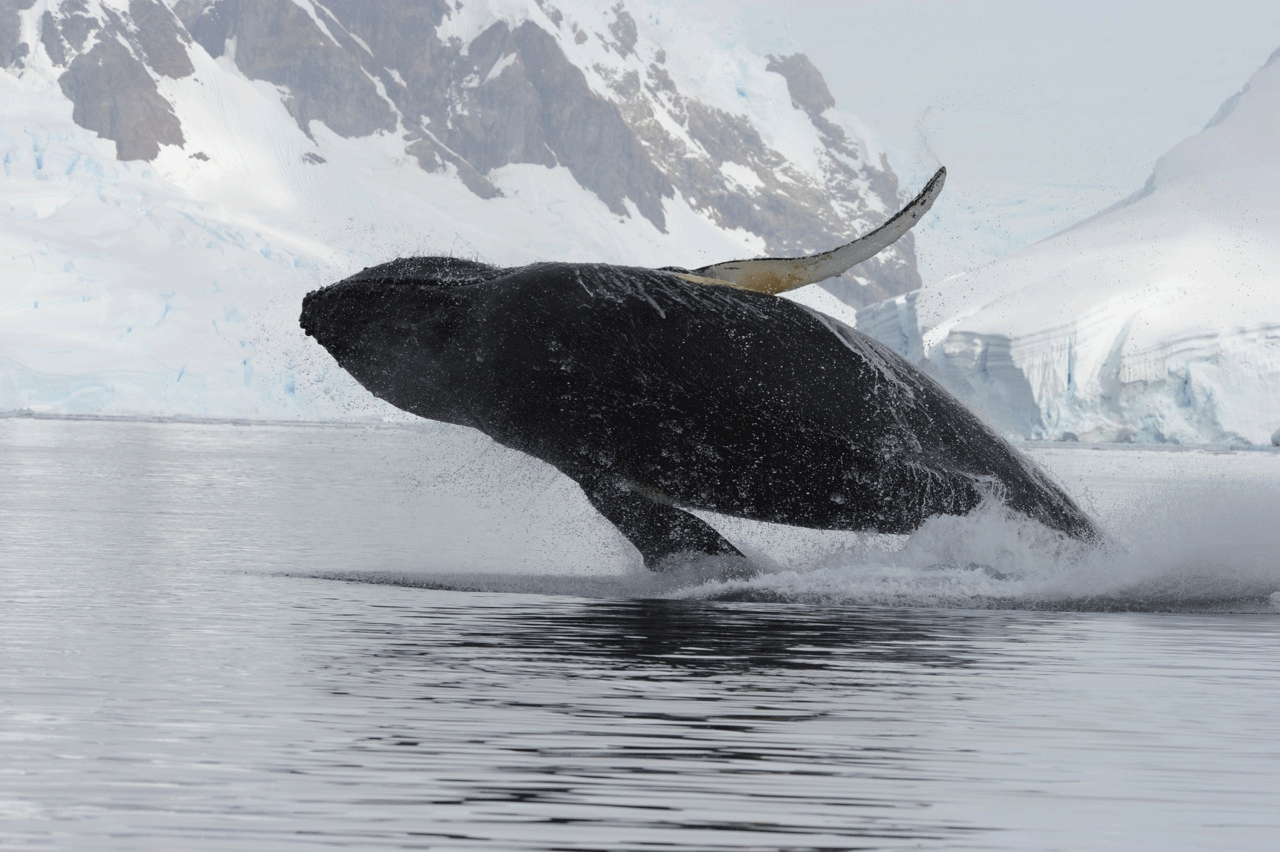 Japan has been hunting whales under the guise of science since a global ban nearly thirty years ago. A new ruling from the International Court of Justice may finally put an end to Japanese whaling. Duke University marine biologist Andy Read explains.
Japan has been hunting whales under the guise of science since a global ban nearly thirty years ago. A new ruling from the International Court of Justice may finally put an end to Japanese whaling. Duke University marine biologist Andy Read explains.
Go to page |
Download/listen
6:35
Original Show Pub Date: 04.Apr.2014
CATEGORY: SPECIES — 31.MAR.2014
 Living On Earth
Living On Earth
The Extreme Life of the Sea —
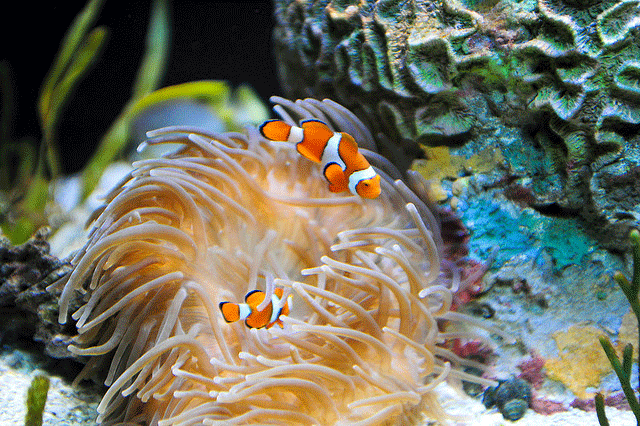 Life in the ocean is a longstanding mystery to most humans. Even with modern technology, we're still learning new things about the ocean. A new book, The Extreme Life of the Sea, sheds an entertaining and informative light on some of the ocean’s oldest, oddest, fiercest and strangest creatures. Coauthor and biologist Steve Palumbi discusses the work.
Life in the ocean is a longstanding mystery to most humans. Even with modern technology, we're still learning new things about the ocean. A new book, The Extreme Life of the Sea, sheds an entertaining and informative light on some of the ocean’s oldest, oddest, fiercest and strangest creatures. Coauthor and biologist Steve Palumbi discusses the work.
Go to page |
Download/listen
11:53
Original Show Pub Date: 21.Mar.2014
CATEGORY: ANIMAL WELFARE, EMPIRE — 26.MAR.2014
 Democracy Now
Democracy Now
FBI Goes Non-Linear on Animal Rights Activists —
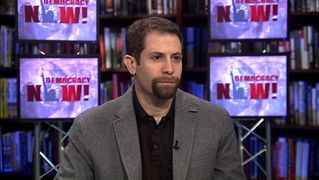 Over the past decade, Ryan Shapiro has become a leading freedom of information activist, unearthing tens of thousands of once-secret documents. His work focuses on how the government infiltrates and monitors political movements, in particular those for animal and environmental rights. Today, he has around 700 Freedom of Information Act requests before the FBI, seeking around 350,000 documents. That tenacity has led the Justice Department to call him the "most prolific" requester there is and claim his dissertation research at the Massachusetts Institute of Technology would "irreparably damage national security." Shapiro discusses his methodology in obtaining government documents through FOIA requests, and the details that have emerged therein about the crackdown on animal rights activists.
Over the past decade, Ryan Shapiro has become a leading freedom of information activist, unearthing tens of thousands of once-secret documents. His work focuses on how the government infiltrates and monitors political movements, in particular those for animal and environmental rights. Today, he has around 700 Freedom of Information Act requests before the FBI, seeking around 350,000 documents. That tenacity has led the Justice Department to call him the "most prolific" requester there is and claim his dissertation research at the Massachusetts Institute of Technology would "irreparably damage national security." Shapiro discusses his methodology in obtaining government documents through FOIA requests, and the details that have emerged therein about the crackdown on animal rights activists.
Watch |
Download/listen
16:26
Original Show Pub Date: 25.Mar.2014
CATEGORY: SPECIES — 13.MAR.2014
 Sierra Club Radio
Sierra Club Radio
The Passenger Pigeon's Flight to Extinction —
At one time, there were 3-5 billion passenger pigeons in the US, with some flocks large enough that their passing through an area could take days. Joel Greenberg, author of A Feathered River Across the Sky, discusses the reasons that the passenger pigeons were hunted, the intentional misinformation that allowed hunting to continue in the face of plummeting pigeon numbers, and the analogs of the pigeons' fate to pressures on species today.
Go to page |
Download/listen
12:23
Original Show Pub Date: 01.Mar.2014
CATEGORY: SPECIES, HABITIAT — 06.MAR.2014
 Living On Earth
Living On Earth
Endangered Oregon Minnow Thriving, To Be Delisted —
A tiny minnow called the Oregon Chub was put on the Endangered Species
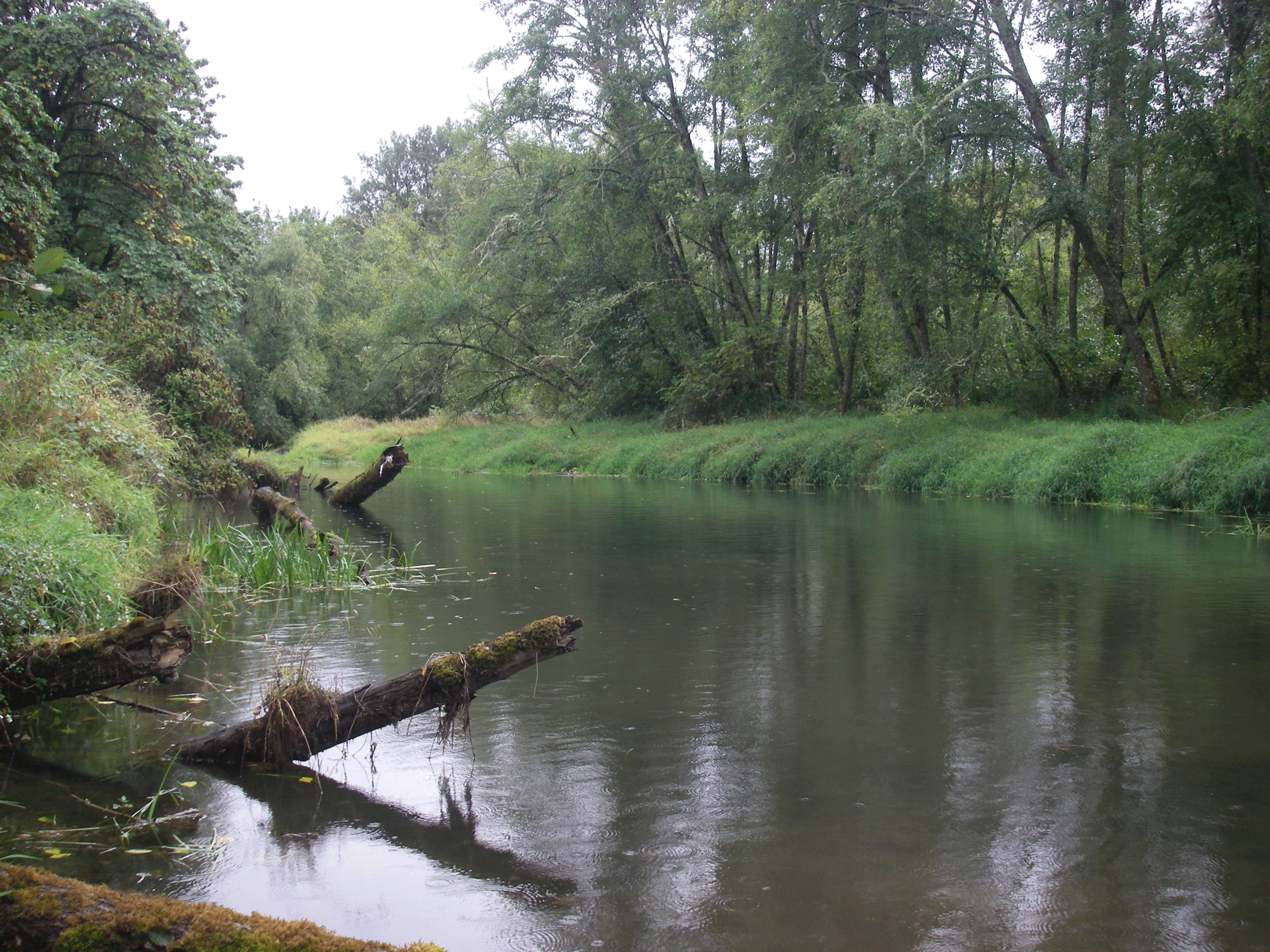 List more than 20 years ago. But the species has rebounded, and now officials want to make it the first fish ever taken off the Endangered Species List because of population recovery.
List more than 20 years ago. But the species has rebounded, and now officials want to make it the first fish ever taken off the Endangered Species List because of population recovery.
Go to page |
Download/listen
5:43
Original Show Pub Date: 28.Feb.2014
CATEGORY: SPECIES — 05.MAR.2014
 Living On Earth
Living On Earth
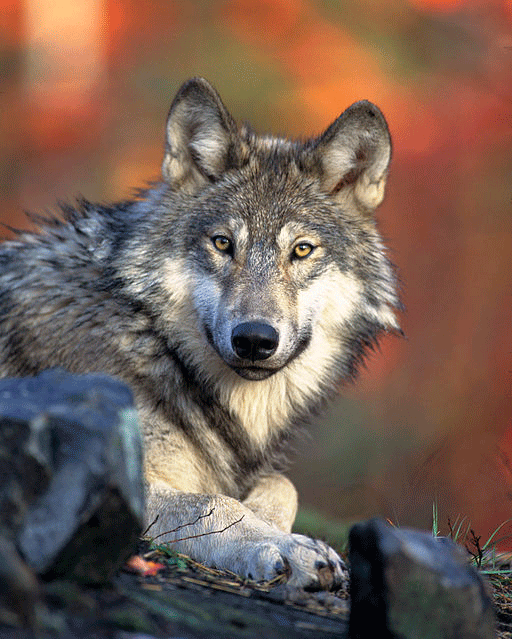 Gray Wolf to Lose Federal Protection Due to Regulatory Trickery —
The US Fish & Wildlife Service plans to drop federal protection for the gray wolf on the basis of a taxonomic reclassification. Geneticist Bob Wayne explains the, um, scientific shortcomings of this action and the repercussions for wolves.
Gray Wolf to Lose Federal Protection Due to Regulatory Trickery —
The US Fish & Wildlife Service plans to drop federal protection for the gray wolf on the basis of a taxonomic reclassification. Geneticist Bob Wayne explains the, um, scientific shortcomings of this action and the repercussions for wolves.
Go to page |
Download/listen
6:14
Original Show Pub Date: 28.Feb.2014
CATEGORY: SPECIES — 01.MAR.2014
 Resistance Radio
Resistance Radio
Mike Mease on Buffalo in the US —
Mike Mease is the co-founder and campaign coordinator for the Buffalo Field Campaign. He has spent the last 16 years living with and helping protect this sacred species in the Yellowstone ecosystem. Here he talks about the status of buffalo in the US west, the history of buffalo slaughter, and the continuing pressure from the cattle industry on the remaining protected buffalo.
Download/listen
49:40
Original Show Pub Date: 16.Feb.2014
CATEGORY: ANIMAL WELFARE, FARMING — 22.FEB.2014
 Food Sleuth Radio
Food Sleuth Radio
Animal Farming the Right Way —
Joe Maxwell is a former Missouri state representative, state senator, and lieutenant governor, and currently is a hog farmer and the vice president of outreach and engagement for the Humane Society of the United States. He talks about the fight against corporate agriculture and the battle for sensible, humane farm-animal policies. Topics include natural resource protections, ag-gag laws, corporate influence, farm policy, and rural community health.
Go to page |
Download/listen
28:15
Original Show Pub Date: 06.Feb.2014
CATEGORY: SPECIES — 18.FEB.2014
 The Daily Show
The Daily Show
Humans—Rather Impressive in Their Species-Obliterating Ability —
Jon Stewart interviews Elizabeth Kolbert, author of The Sixth Extinction, which describes the habits of Earth's most invasive species—humans. Stewart is impressed that we are as powerful as ice ages and killer asteroids—two of the more noteable wiper-outers in past epochs. Kolbert agrees, adding that we're doing it without even trying!
Watch |
Download/listen
7:08
Original Show Pub Date: 11.Feb.2014
CATEGORY: SPECIES — 14.FEB.2014
 Quirks & Quarks
Quirks & Quarks
Will The Killer Cold Take Care of the Emerald Ash Borer? —
Gardeners know a very cold winter helps reduce the number of garden pests that can successfully overwinter. Is the cold having a similar effect on invasive insect species like the emerald ash borer? To some extent, but with a glycol-based antifreeze system, the borer can survive down to -30 C.
Go to page |
Download/listen
5:06
Original Show Pub Date: 08.Feb.2014
CATEGORY: SPECIES, ENVIRONMENT — 13.FEB.2014
 NPR
NPR
The Earth's Sixth Extinction — One Of Our Own Making —
There have been five major mass extinctions over the last half-billion years, when the diversity of life on Earth suddenly and dramatically contracted. Scientists are currently monitoring a new era of mass extinction, predicted to be the most devastating since the asteroid impact that wiped out the dinosaurs. But this time around, says Elizabeth Kolbert, author of The Sixth Extinction, it's humans that are causing it.
Go to page |
Download/listen
8:50
Original Show Pub Date: 11.Feb.2014
CATEGORY: SPECIES, CLIMATE — 11.FEB.2014
 Quirks & Quarks
Quirks & Quarks
 Polar Bears Attempting Diet Shift as Climate Reduces Seal Availability —
Climate change is forcing polar bears in some areas to change their diet. The early break-up of Arctic sea ice has made it more difficult for the bears to hunt seals in northern Hudson Bay. But a new study has found that the polar bears have adopted a different strategy—feeding on eggs in inland colonies of nesting birds. Can this egg-centric diet sustain the bears? Can the birds' life cycles survive the sharp increase in bear predation?
Polar Bears Attempting Diet Shift as Climate Reduces Seal Availability —
Climate change is forcing polar bears in some areas to change their diet. The early break-up of Arctic sea ice has made it more difficult for the bears to hunt seals in northern Hudson Bay. But a new study has found that the polar bears have adopted a different strategy—feeding on eggs in inland colonies of nesting birds. Can this egg-centric diet sustain the bears? Can the birds' life cycles survive the sharp increase in bear predation?
Go to page |
Download/listen
8:41
Original Show Pub Date: 08.Feb.2014
CATEGORY: SPECIES — 23.JAN.2014
 Resistance Radio
Resistance Radio
The War on Wolves —
 John Horning of Wild Earth Guardians discusses the relentless efforts of Western ranchers to exterminate wolves. Also discussed is a similar effort to eradicate the prairie dog. A common factor between wolves and prairie dogs is that they are keystone species—their native ecosystems don't work properly when they are absent.
John Horning of Wild Earth Guardians discusses the relentless efforts of Western ranchers to exterminate wolves. Also discussed is a similar effort to eradicate the prairie dog. A common factor between wolves and prairie dogs is that they are keystone species—their native ecosystems don't work properly when they are absent.
Download/listen
58:00
Original Show Pub Date: 12.Jan.2014
CATEGORY: FORESTS, SPECIES —
15.JAN.2014
 NPR
NPR
Natural Gas Boom Adds to Forest Fragmentation —
Forest fragmentation is what happens when human development crisscrosses the landscape, carving up large swaths of contiguous forest into smaller pieces. In Pennsylvania, the current natural gas boom is exacerbating the problem. Everything from the noise, traffic, and lighting to pad placements and pipeline construction are inherently incompatible with sustainable forest management and healthy habitats.
Go to page |
Download/Listen
4:11
Original Show Pub Date: 09.Jan.2014
CATEGORIES: FOOD, ENVIRONMENT, ANIMAL WELFARE —
06.JAN.2014
 Sea Change Radio
Sea Change Radio
Meat—From Livestock to Lab-Stock? —
"Cruelty-free" products abound in our 21st Century market place, from cosmetics to fake fur. But can you imagine a cruelty-free filet mignon? Food journalist Tom Levitt discusses recent advances in lab-grown meat.
Go to page |
Download/Listen
30:00
Original Show Pub Date: 10.Dec.2013
 Quirks & Quarks
Quirks & Quarks
Less Salmon Means Less-Healthy Grizzlies —
07 Dec 2013 —
The decline in the salmon population off the coast of British Columbia in recent years is having negative consequences for the grizzly bears, who rely on them for food. By analyzing hair retrieved from grizzlies at snag stations over a three-year period, scientists determined that the level of the stress hormone cortisol was elevated in the bears eating less salmon. It is believed that raised cortisol levels could negatively impact grizzlies' reproductive health and shorten their lifespans.
Go to page |
Download/Listen
7:32
|
 Quirks & Quarks
Quirks & Quarks
Persistent Pollutants Still Plague Gulls —
30 Nov 2013 —
The glaucous gull is a large, omnivorous top predator in its particular food web in Arctic regions around the world. Recent research by toxicologists has found that persistent chemical pollutants like DDT and PCB, which were banned in the 1970s, still persist in the frigid Arctic and are still harming gull health. Similarly, some flame retardants that were banned years ago still show up in the birds. However, scientists were surprised to find evidence of six new flame retardants in the gulls as well.
Go to page |
Download/Listen
8:28
|
|
 Quirks & Quarks
Quirks & Quarks
Improving the Plight of Chimpanzees —
12 Oct 2013 —
When veterinarian Sheri Speed first witnessed chimpanzees chained up in small cages for the amusement of hotel guests in Cameroon, it changed her life. The chimps were malnourished and unhappy; some had been orphaned by the illegal bush meat trade; and one had been captive for 40 years. Speed promised herself she would change their lives; and she did. She discusses overcoming obstacles and resistance to establish a chimpanzee sanctuary in Cameroon.
Go to page |
Download/Listen
16:49
 Living On Earth
Living On Earth
CWD/Mad Cow Type Prions Found in Plants —
04 Oct 2013 —
Prions are misshapen, infectious proteins that cause a number of fatal diseases, including mad cow disease, characterized by holes in the brain matter. The US deer and elk herd is infected with another prion illness, Chronic Wasting Disease. New research shows that prions can also persist in soil and be absorbed by plants.
Go to page |
Download/Listen
7:26
 NPR
NPR
Whatever Happened To The Deal To Save The Everglades? —
10 Oct 2013 —
In 2008, Florida announced that it would buy and protect hundreds of miles of Everglades land owned by US Sugar. But due to the economic downturn, only a small fraction was acquired. Now, environmental groups are lobbying for the deal's revival before a contract giving the state an exclusive option to buy expires.
Go to page |
Download/Listen
4:37
 Living On Earth
Living On Earth
The Spongy Secret of Coral Reefs —
18 Oct 2013 —
Since Darwin's day, scientists have wondered how vibrant coral reefs thrive in the nutrient-poor waters of the tropics. Jasper de Goeij of the University of Amsterdam in the Netherlands says that the humble sponge is the key.
Go to page |
Download/Listen
6:28
 NPR
NPR
Murky Waters Causing Manatee Deaths —
26 Sep 2013 —
Over the past year, record numbers of dolphins, manatees and pelicans have turned up dead in the 150-mile-long estuary that runs along Florida's Atlantic Coast. Bouts of algal blooms have flourished in the waters. All signs point to an ecosystem that is seriously out of balance, largely due to the way humans have changed the flow of water in the area.
Go to page |
Download/Listen
5:51
|
 Sea Change Radio
Sea Change Radio
Cousins In The Mist —
17 Sep 2013 —
In 1988, the film Gorillas in the Mist brought well-warranted attention to the plight of the mountain gorilla. In the intervening years, the story of how the mountain gorilla has been saved from extinction has been a prominent narrative for the animal conservation movement. But we haven't heard much lately about the mountain gorilla. And what of the closely related lowland gorillas, which are much more numerous than their mountain brethren but are facing their own threats to survival? Guest is Chris Whittier, professor of veterinary medicine.
Go to page |
Download/Listen
30:00
|
|
 Quirks & Quarks
Quirks & Quarks
Cultured Meat—Flesh or Fantasy? —
07 Sep 2013 —
A scientist created a burger made entirely of meat cells grown in a laboratory, and then he had the burger cooked by a chef and tasted by two food critics—all to much fanfare. But cultured meat—meat grown without animals—is still a long way from supermarket shelves, given that this particular burger cost a couple hundred thousand dollars to produce. Does lab meat really have the potential to supplant normal meat and thereby reduce the animal welfare impact of our diets?
Go to page |
Download/Listen
24:53
 Quirks & Quarks
Quirks & Quarks
Happy Sea Otters Means Healthy Sea Grass and Ecosystems —
14 Sep 2013—
Sea grass is found in many coastal regions around the world, but it is becoming increasingly threatened by chemicals found in agricultural and urban run-off, which create algal blooms that degrade the sea grass. But in one estuary off California's Monterey Bay, the sea grass is thriving in spite of the chemicals. Ecologist Brent Hughes explains how the sea otters there are a key factor in a food-chain effect that counterbalances the effect of nutrient runoff.
Go to page |
Download/Listen
8:10
 NPR
NPR
Once Resilient, Trees in the West Now More Vulnerable to Fires —
29 Jul 2013 —
Every few decades, nature cleans house in the forest. It burns the understory and brush—the "ladder fuels" that might carry a fire up into the tree canopy if they accumulate too much. Excessive fuel buildup can lead to the kind of fire that kills forests. But scientists are discovering that some trees in the West that previously would survive and thrive with small fires are now losing their ability to do so.
Go to page |
Download/Listen
3:25
|
 Quirks & Quarks
Quirks & Quarks
The Unfair Plight of "Trash Animals" —
28 Jun 2013 —
From prairie dogs and coyotes to stinky fish and Canadian geese, some animals just don't find a place in our hearts. How did some species become so unliked by humans that we started calling them "trash animals"?
Go to page |
Download/Listen
9:35
|
|
|
 Living On Earth
Living On Earth
Three Rules for Sustainable Ocean Fishing —
21 Jun 2013 —
We hear a great deal about the nutritional value of fish, but it seems to be getting increasingly difficult to eat seafood sustainably. Andy Sharpless discusses how we can better manage our fisheries with three rules: (1) set and enforce sustainable catch limits; (2) protect the coastal spawning grounds (which are often damaged by bottom trawlers); (3) set and enforce limits on bycatch (of non-target species). He also explains why fish farming of carnivore species like salmon is not sustainable.
Go to page |
Download/Listen
11:22
|
|
 One Radio Network
One Radio Network
Is Monsanto's RoundUp Herbicide the Cause of Honeybees' Colony Collapse Disorder? —
28 May 2013 —
Terrence Ingram, an Illinois beekeeper with five decades of experience, explains the evidence that has convinced him that Monsanto's herbicide RoundUp is a key factor in colony collapse disorder. Also rather shocking in the story is the ineptitude and duplicity of the Illinois Department of Agriculture, which destroyed his bees after they falsely claimed his colony's were diseased. Ingram suspects the raid had more to do with his 15 years of research into how Roundup kills bees than with any actual concerns about his hives.
Go to page |
Download/Listen
1:03:39
 NPR
NPR
Rule Would List All Chimps As Endangered, Even Lab Animals —
14 Jun 2013 —
The US Fish and Wildlife Service has proposed a new rule that would extend endangered species protection to chimpanzees held in captivity. Nearly half of all the chimps in the US live in research facilities, and the new rule would make it more difficult to use these animals in medical experiments.
Go to page |
Download/Listen
3:47
 Against the Grain
Against the Grain
Animal Rights and We the People —
Paul Waldau discuses many facets of animal welfare and rights, including... the legal basis vs. the moral basis for animal rights; the long history of civilizations having deep respect for animals; the problem of food animals in industrial agriculture; pets as a special category in modern life; animals used in lab testing; the difference between the concepts of animal welfare and animal rights; the intersection of human rights and animal rights.—
29 May 2013
Go to page |
Download/Listen
52:00
 Quirks & Quarks
Quirks & Quarks
Wings Hold Key in Bats' White-Nose Syndrome —
01 Jun 2013 —
The bat population in North America is in serious decline as a result of an infectious fungal disease known as White-Nose Syndrome. It is an infection that only affects the skin of the bat, and is so named because it appears as a white mark on the bat's nose. But a new study has focused on the bat's wings, where the infection results in lesions similar to burns. The resulting skin damage causes dehydration, which causes the bat to warm up too often during hibernation and use up fat reserves too quickly.
Go to page |
Download/Listen
10:10
 Quirks & Quarks
Quirks & Quarks
Malaria's Malign Modification of Mosquitoes —
01 Jun 2013 —
The malaria parasite is one of the world's most fearsome diseases, causing 200 million infections every year worldwide, with nearly 1 million deaths. Part of the parasite's strategy seems to be giving superpowers to the mosquitoes that carry it. Researchers have found that mosquitoes infected with malaria are far better at finding human hosts than normal mosquitoes. They suspect that somehow the parasite is enhancing the mosquito's ability to smell human odors.
Go to page |
Download/Listen
9:19
 NPR
NPR
Big-Mouthed Toucans Key To Forest Evolution —
31 May 2013 —
The jucara, the dominant palm tree in the Brazilian Atlantic rainforest, is dependent on the toucan—a bird with an almost comically giant bill that can be half as long as its body—to disperse its large seeds. But as more humans have moved into Brazil's Atlantic coastal forests, the increased hunting, logging, and farming have taken a toll on the number of toucans. Now scientists have discovered that the drop-off in birds is reshaping the forest as well—and that's not a good thing.
Go to page |
Download/Listen
3:20
 On The Media
On The Media
Undercover in an Industrial Slaughterhouse
—
19 Apr 2013 —
In the May issue of Harper's, Ted Conover, a longtime undercover journalist, details his undercover job as an federal meat inspector at an industrial slaughterhouse. Conover talks about meat safety, going undercover, and why it's necessary to bring a hidden world to light. The bottom line here is that not all slaughterhouses are full of profit-mad sadists, but all have their issues.
Go to page |
Download/Listen
9:45
 Progressive Commentary Hour
Progressive Commentary Hour
Plight of the Honey Bee —
15 Apr 2013—
This is a panel discussion on the current status of the honeybee industry. Pesticides and other factors are continuing to foster the decline of these important pollinators. Gary Null's guests are Larissa Walker of the Center for Food Safety; Dr. Neil Carman, who researches and assesses the evidence of genetic engineering's impact upon the environment and animal and plant life; and Steve Ellis, a commercial beekeeper and one of the plaintiffs in a lawsuit asserting that the EPA is failing to protect America's bee population.
Download/Listen
56:00
 Democracy Now
Democracy Now
As Video Footage Brings Animal Abuse to Light (and Prosecution), Ag Gag Bills Loom —
09 Apr 2013 —
An animal rights investigator details how he has spent over a decade secretly filming animal abuse—much of which led to prosecutions for violations of animal-cruelty and farm-animal-abuse laws—and why that work is now imperiled by the wave of "Ag Gag" laws sweeping the country. ~~ Then a debate on the merits of the so-called "Ag Gag" bills, featuring Emily Meredith of the Animal Agriculture Alliance, an industry group, and independent journalist Will Potter.
Watch 1 |
Watch 2 |
Download/Listen
46:42
 Living on Earth
Living on Earth
As More Polar Ice Melts, More Polar Bears Starve —
15 Feb 2013 —
Polar Bears have long been the poster species for the problem of climate change. As the polar ices becomes less and less each year, the habitat for polar bears and their seal prey shrinks. A new paper in Conservation Letters argues that supplemental feeding may be necessary to prevent polar bear populations from going extinct. Polar bear expert Andrew Derocher explains.
Go to page |
Download/Listen
8:24
|
 Quirks & Quarks
Quirks & Quarks
Battle of the Invasive Ants —
16 Feb 2013 —
The Argentine ant and the Asian needle ant are both invasive to the US. The Argentine ant arrived first, but even in areas where it was already established, it's losing ground to the Asian needle ant, which gets going earlier in the spring. More important than who is winning that battle, though, is this: The invasives are pushing out native ant species, with many of the ecosystem functions provided by the native ants disappearing in the process.
Go to page |
Download/Listen
8:57
|
|
 NPR
NPR
Is Sustainable-Labeled Seafood Really Sustainable? —
11 Feb 2013 —
The Marine Stewardship Council's "sustainably caught" label is supposed to guarantee that the fish you buy is not a part of an overfishing operation. But as Walmart and other big retailers have jumped onto the sustainable-seafood bandwagon, demand has skyrocketed and the MSC's standards have slipped.
Go to page |
Download/Listen
22:50
 Food Chain Radio
Food Chain Radio
The Lone Wolf of California —
26 Jan 2013 —
After being collared and released into the wilds of northeast Oregon, wolf OR-7 trekked 3,000 miles, finally ending up in northern California—the first wolf to naturally find himself there in quite a while. Topics include why wolves were re-introduced into the American West; how the conflict between those who want wolves to run free and those who do not is mediated; and the impact of wolves on ecosystems and commerce.
Go to page |
Download/Listen
41:30
|
 Quirks & Quarks
Quirks & Quarks
Caribbean Coral in Crisis —
09 Feb 2013 —
A new study finds that the rate of coral growth in the Caribbean is only about half of what it should be, and the amount of coral actually present is only 20 percent of what should be there. There are both natural and human-caused reasons for coral decline, but scientists say the human causes will be particularly hard to address. Dr. Evan Edinger explains.
Go to page |
Download/Listen
7:39
|
|
 Living On Earth
Living On Earth
America's Bats on the Brink —
25 Jan 2013 —
Bats should be hibernating this time of year, but winter visitors to the Great Smoky Mountains National Park have spotted them flying around in the middle of the day. Scientists suspect their odd behavior may be caused by white nose syndrome, a disease that is devastating the US bat population. Katie Gillies of Bat Conservation International discusses the state of bats in the United States, warning that we are witnessing an extinction event on an unparalleled scale, and the impact on their natural pest-control services is likely to affect humans bigtime.
Go to page |
Download/Listen
6:49
 Living On Earth
Living On Earth
Can Prairie Dogs Save Mexico's Prairie From the Desert? —
25 Jan 2013 —
There were once an estimated 32 billion black-tailed prairie dogs across the prairies of the US West and Mexico. Today, only 1-2 million remain, the rest having been largely wiped out by ranchers in a long-term extermination effort. But ironically, the lack of prairie dogs changed the ecosystems in a way that eventually made the areas unusable for grazing. Now activists in Mexico are working to bring back the prairie dogs and help restore the prairie as well.
Go to page |
Download/Listen
6:06
 Quirks & Quarks
Quirks & Quarks
Counting the Bugs in a Rainforest —
19 Jan 2013 —
Most species of insects and arachnids are found in tropical rainforests. Over 100 scientists from 21 countries recently set out to explore arthropod diversity by way of a detailed headcount in a small area of Panamanian rainforest. Dr. Neville Winchester reviews the findings.
Go to page |
Download/Listen
8:09
|
 Quirks and Quarks
Quirks and Quarks
Planet Without Apes —
15 Dec 2012 —
Great Apes, our closest living relatives, may be gone within the century. Chimpanzees, orangutans, bonobos and gorillas are all threatened by habitat loss, poaching, disease, consumption of bush meat, and political instability in the countries in which they live. Dr. Craig Stanford, author of Planet Without Apes, explores the specific threats to each of the Great Apes and warns that without them, the last link to our own evolutionary past will be lost forever.
Go to page |
Download/Listen
17:16
|
|
 Living On Earth
Living On Earth
Trouble for the King of Beasts —
07 Dec 2012 —
Africa's "king of beasts" is now more threatened than ever before. Lion populations have dropped sharply in the last fifty years, largely due to habitat loss and poaching. Conservationist Stuart Pimm discusses a new lion habitat survey.
Go to page |
Download/Listen
7:20
 Food Chain Radio
Food Chain Radio
Suburban Wildlife—An Important Connection with Nature or Just a Nuisance? —
17 Nov 2012 —
James Sterba, author of Nature Wars, discusses the modern wild animal, which lives fearlessly in the tame plains of suburbia. En mass, these animals can be nuisances and can cause property damage and personal injury. Topics include why so many wild animals now live in cities and suburbs; why cities are so inviting to wild animals; innovative ideas for using the meat from culls; and how the management, or lack thereof, of city wildlife is now sparking "nature wars" throughout neighborhoods.
Go to page |
Download/Listen
42:53
 Quirks & Quarks
Quirks & Quarks
Whales for the Killing —
27 Oct 2012 —
Commercial whaling was banned by international agreement in 1986. But even outside of the hunting that nations like Japan and Norway continue to pursue, human activity is still killing whales in large numbers. Canadian marine biologist Julie van der Hoop explains the data on whale mortality from a studied area of the North Atlantic coast. The data showed a significant number of whale deaths from causes such as ship strikes and fishing-gear entanglement.
Go to page |
Download/Listen
8:38
 Unwelcome Guests
Unwelcome Guests
The 6th Mass Extinction — 24 Nov 2012 — So, how is the life on earth faring under corporate globalization? Well, not so good. The first segment of the two hours is a radio adaptation of the video Call of Life, which focuses on the mass extinction already under way, the 6th in earth's history, and the greatest for at least 65,000,000 years. Then an excerpt from Meet Your Meat describes the suffering inflicted on animals by the agribusiness industry. The concluding segment is a radio adaptation of the parable The Man Who Planted Trees, which tells the enchanting story of a French shepherd determined to re-forest a desolate valley.
Ref Page: Go to page
Part 1: Download/Listen
59:30
Part 2: Download/Listen
59:30
Referenced video:
Watch free: The Man Who Planted Trees
 NPR
NPR
Nitrogen Runoff—A Marsh Killer —
18 Oct 2012 —
Marshes along streams and estuaries protect land from storm surges. But they're disappearing fast and scientists have now confirmed the role of a suspected marsh killer—runoff pollution. Nitrogen from fertilizers and sewage is carried via rain runoff to marshes. This makes plants grow faster on the top, but their roots don't keep up and can't adequately grip the soil. The soil banks collapse and the marsh turns to mud.
Go to page |
Download/Listen
3:34
 Living on Earth
Living on Earth
The Dance of Life —
19 Oct 2012 —
There is an intricate relationship between plants and their environments—climate, pest levels, and other factors. Biologist Anurag Agrawal explains how plants can evolve and adapt in near-real time to changing pest threats and other emergent conditions.
Go to page |
Download/Listen
7:11
 NPR
NPR
The Climate Change Threat to "Plankton Services" —
30 Sep 2012 —
Plankton—tiny ocean organisms—are vital to life on Earth, generating enough oxygen to account for every other breath you take. As climate change alters the temperature and acidity of our waters, these mysterious ocean creatures may be in jeopardy.
Go to page |
Download/Listen
3:27
 Making Contact
Making Contact
The Burning Issue—America's War on Fire —
18 Sep 2012 —
Every summer, wildfires torch thousands of acres of land; some years more than others. For every fire, the National Forest Service rushes to the rescue—to save lives, homes, and communities. But is the agency's approach to fire doing more harm than good? Ecologists say yes, and even some firefighters are starting to agree. But the issue is far from settled.
Go to page |
Download/Listen
28:56
 Food Chain Radio
Food Chain Radio
Animal Rights & Wrongs —
08 Sep 2012 —
Matt Rice of Mercy For Animals and Kay Johnson Smith of Animal Agriculture Alliance discuss the state of farm-animal welfare, using as a jumping-off point the recently released video showing downer cows being slaughtered inhumanely and leading to the federal government closing the abattoir. Topics include the rights given animals in agriculture; who gives those rights to the animals; and whether the animals can be treated humanely enough to satisfy the people who advocate for them.
Go to page |
Download/Listen
42:34
 Uprising
Uprising
"Catch Shares"—A Model for Sustainable Fishing? —
22 Aug 2012 —
Catch Shares are fishery management systems that dedicate a secure privilege to harvest a specific area or percentage of a fishery's total allowable catch to individuals, communities or associations. Hundreds of such programs have been implemented worldwide. A new study assesses which ones are successful and why.
Go to page |
Download/Listen
13:05
 Sierra Club Radio
Sierra Club Radio
How Smart Birds Behave Like Humans —
25 Aug 2012 —
John Marzluff, author of Gifts of the Crow: How Perception, Emotion, and Thought Allow Smart Birds to Behave Like Humans discusses evidence of intelligence in birds, including facial recognition and grieving.
Page to download entire show |
Download/listen to this segment
14:52
 Living On Earth
Living On Earth
Marine Reserves Protect Coastal Biodiversity and Ocean Vitality — 03 Aug 2012 — Marine reserves are sanctuaries in oceans and coastal waters where no fishing is allowed, and often no hunting of any kind. More countries are setting aside these areas, but economic pressures often limit the size of the reserves to less than optimal effectiveness.
Part 1:
Go to page |
Download/Listen
6:44
Part 2:
Go to page |
Download/Listen
6:55
|
 NPR
NPR
Birds, Glass Buildings, and Architectural Solutions — 08 Aug 2012 — Modern architecture loves glass. But glass also kills tens of millions of birds every year when they collide with windows. Now, researchers are trying to learn what birds can see, in an attempt to build better, more bird-friendly buildings.
Part 1: Go to page |
Download/Listen
4:46
Part 2: Go to page |
Download/Listen
7:47
|
|
 NPR
NPR
No Space, Mate—Koalas' Habitat Under Threat — 04 Aug 2012 — Earlier this year, the Australian government added the koala to the country's list of endangered species. By some counts, only about 100,000 remain in the wild in a country that once boasted a population in the millions. But many conservationists say the listing doesn't go far enough.
Go to page |
Download/Listen
5:28
 Unwelcome Guests
Unwelcome Guests
Lessons from Animals and the Meaning of Life — 16 Jun 2012 — The show starts with a riveting speech by Charlie Chaplin from The Great Dictator. ~~ Then a reading of Steve Talbott's "How Biologists Lost Sight of The Meaning of Life," an essay on the tendency of biologists to look at the world as if it were a mechanistic specimen in a lab, not as the ensouled place in which they live. ~~ Finally, Jane Goodall on the important lessons from animals and the dictate for personal choice and taking responsibility in preventing ecological disaster.
Go to page |
Download/Listen
59:30
 Living On Earth
Living On Earth
Removing Dams, Healing Rivers, Helping Species — 15 Jun 2012 — Archaic dams are coming down across the United States, giving new life to river ecosystems and a new chance for fish and other native species. John Catena of the National Oceanic and Atmospheric Administration explains why dam removal not only clears the way for migrating fish, but also benefits local communities.
Go to page |
Download/Listen
5:59
 Unwelcome Guests
Unwelcome Guests
The Superior Human... Or Not — 02 Jun 2012 — Most humans, whether due to religious doctrine or intellectual conclusion, think humans are obviously the superior species on the planet. But is this just speciesism? This radio adaptation of the 2012 film The Superior Human examines the various reasons people think humans are somehow special and superior to other life forms. The most obvious characteristics that make humans superior turn out to be not-so-obvious on deeper examination.
Ref Page: Go to page
Part 1: Download/Listen
59:30
Part 2: Download/Listen
59:30
 Radio Ecoshock
Radio Ecoshock
Why are Forests Dying Around the World? — 16 May 2012 — Forests around the world are dying from insects, fungus, drought, and heat. But the underlying drivers are climate change and ozone pollution. Activist Gail Zawacki explains how ground-level ozone is damaging trees and crops—and our lungs.
Go to page |
Download/Listen
1:00:00
 Living On Earth
Living On Earth
Brazil's New Forest Code Under Fire — 11 May 2012 — A new proposed law to reduce Amazon deforestation in Brazil would pay landowners to reforest land, rather than fining them. But environmentalists say the bill will simply codify the profitability of deforestation.
Go to page |
Download/Listen
8:33
 Sierra Club Radio
Sierra Club Radio
Jim Robbins on Preserving Important Tree Species — 12 May 2012 — Jim Robbins talks about the reasons we need to be preserving the genetics of important tree species. He is author of The Man Who Planted Trees—Lost Groves, Champion Trees, and an Urgent Plan to Save the Planet.
Download/listen to this segment
8:16
Page to get full show
Related movie:
The Man Who Planted Trees (watch free)
 NPR
NPR
Preserving Mangroves — 30 Apr 2012 — Indonesia has the largest share of the world's mangroves—coastal forests that have adapted to saltwater environments. They play important roles in filtering water, buffering storms, providing habitat, and sequestering carbon. The challenge is convincing locals that they benefit more from protecting the trees rather than cutting them down.
Go to page |
Download/Listen
5:50
|
 Living on Earth
Living on Earth
Klamath Wetlands in Peril — 04 May 2012 — Fifty years ago, the Lower Klamath National Wildlife Refuge had the greatest concentration of waterfowl in North America. But in recent years, migration brings fewer and fewer birds. Water destined for the wetlands is diverted for agriculture according to human-centric water laws, leaving birds high and dry, and sometimes dead.
Go to page |
Download/Listen
8:18
|
|
 Sierra Club Radio
Sierra Club Radio
Carter Niemeryer, "Wolfer"—Wolves in the Northern Rockies — 05 May 2012 — Niemeryer discusses his transition from wolf-management black hat to wolf friend white hat, as well as some of the myths about wolves in the West, their recovery, and supposed wolf problems for humans.
Page to download whole show |
Listen/download this segment
6:10
 Food Chain Radio
Food Chain Radio
Pig Farming The Right Way — 14 Apr 2012 — Most farm animals have been taken off the farm and are raised industrial facilities controlled by a few large corporations. Walter Jeffries of Vermont's Sugar Mountain Farm discusses the pig raising practices used on his small farm—including pasture fed and free-roaming.
Download/Listen
42:40
More Food Chain Radio
 NPR
NPR
Polar Bears, Melting Ice, and Species Preservation — 03 Apr 2012 — Polar bears depend on sea ice, but that habitat is slowly disintegrating. The bears do sometimes hunt on land but cannot feed themselves sufficiently in that environment alone. Zoos are trying to figure out the best way to keep a number of them in captivity—to preserve the gene pool.
Go to page |
Download/Listen
5:09
 Sierra Club Radio
Sierra Club Radio
Additional Panther Habitat Protected — 07 Apr 2012 — There are only 100-150 Florida panthers left. A new multi-party agreement will help protect panther habitat and extend their available range of movement.
Download/listen to this segment
6:14
Page to get full show
 Living On Earth
Living On Earth
The Continuing Plight of the Sage Grouse — 13 Apr 2012 — An update to a story about the Sage Grouse and how an unlikely alliance has come together to protect the bird, without putting it on the federal endangered species list.
Go to page |
Download/Listen
9:18
 Uprising
Uprising
How Big-Name Conservation Groups Are Selling Out to Corporations — 28 Mar 2012 — Bio-scientist Jonathan Latham delves deeper into the issue of greenwashing among some of the best known groups working on conservation of species and habitat. Are ties to major corporations like Coca Cola, Bank of America, and Monsanto undermining the stated principles of groups like the World Wildlife Fund?
Go to page |
Download/Listen
15:59
 You Bet Your Garden
You Bet Your Garden
Update on Bats — 24 Mar 2012 — Hazel Barton discusses bats—their voracious pest eating, the latest on white-nose fungus and bat numbers, and how you can help bats by building bat houses. ~~ Other topics in the show include ideas for a basic garden for beginners; solarizing to kill a patch of tough weeds; and tips for growing great carrots.
Download/Listen
52:14
More YBYG
 Living On Earth
Living On Earth
The World's Largest Wildlife Conservation Area — 30 Mar 2012 — Eleven countries in the Sahel region of Africa have an initiative to plant a 4,300-mile-long "wall of trees" across the continent, aiming to hold back the sands of the Sahara.
Go to page |
Download/Listen
7:22
 Living On Earth
Living On Earth
Urban Tree Cover Declining — 09 Mar 2012 — A new US Forest Service study shows tree cover in 20 US cities is declining rapidly.
Go to page |
Download/Listen
6:38
 Living On Earth
Living On Earth
More Rainforest Falling to Hydro Power — 16 Mar 2012 — The Brazilian government has proposed to re-map the Amazon, removing protection for more than 200,000 acres of rainforest to make way for hydroelectric dams.
Go to page |
Download/Listen
8:30
 Living On Earth
Living On Earth
Using Cameras Drones to Fight Deforestation, Poaching, and Habitat Destruction — 16 Mar 2012 — Drones armed with cameras are a new weapon to fight deforestation, animal poaching and habitat destruction. Scientist Lian Pin Koh explains the conservation value of these miniature observation platforms.
Go to page |
Download/Listen
7:18
 Uprising
Uprising
Utah Considers Law Criminalizing Photography of Farms by Animal Rights Activists — 23 Feb 2012 — The Utah state House is considering a law that would make it a crime to take a picture of a farm, while on the property, without consent from the farmer. The legislation is aimed at animal right activists who covertly film and photograph animals that live in objectionable conditions. Will Potter discusses the law and the broader issue of animal and environmental activists being increasingly branded as domestic terrorists.
Go to page |
Download/Listen
14:12
 NPR
NPR
Good News/Bad News Bears — 20 Feb 2012 — The good news for black bears is that they have healthy populations that continue to expand in the US. The bad news is that not everyone is happy about bears in the back yard.
Go to page |
Download/Listen
3:44
 Sierra Club Radio
Sierra Club Radio
Obama Protects Grand Canyon Area — 04 Feb 2012 — Fran Hunt from the Sierra Club's Resilient Habitats campaign discusses Obama's decision to protect more than a million acres around the Grand Canyon from mining and other development activities. ~~ Tacked onto the end of this clip are short pieces about clean energy awareness on campus, green cleaning tips, and using kale in winter meals.
Go to page |
Download/Listen
14:22
 Living on Earth
Living on Earth
Dying Yellow Cedars — 17 Feb 2012 — Something is killing the majestic yellow cedar trees of southeastern Alaska and parts of British Columbia. Scientists have been baffled for decades but now they have an answer—it's climate change, sort of.
Go to page |
Download/Listen
5:44
 NPR
NPR
Pythons Blamed For Everglade's Disappearing Animals — 31 Jan 2012 — The Florida Everglades are infested with Burmese pythons, which are not native to the area. Scientists have discovered the pythons are having a devastating impact on the populations of local wildlife.
Go to page |
Download/Listen
3:30
 NPR
NPR
Labs Size Up New Guidelines For Rodent Cages — 16 Jan 2012 — Scientists do experiments with millions of rats and mice each year, to study everything from heart disease to cancer and diabetes. Recently, some new recommendations about how to house female lab rodents and their babies caused an uproar.
Go to page |
Download/Listen
7:47
 Quirks and Quarks
Quirks and Quarks
Polar Bears and Sea Ice — 17 Dec 2011 — The greatest symbol of the Arctic is the polar bear. Its sheer size, its power, and its majestic bearing are emblems of the vastness, remoteness, and ruggedness of the frozen north. But the polar bear is in trouble—serious trouble. Dr. Ian Stirling discusses the iconic animal's habits, hunting techniques, and habitat, and ponders polar bears' uncertain future in a warming world.
Go to page |
Download/Listen
18:25
AD CLICKS AND AMAZON PURCHASES FROM HERE HELP SUPPORT THIS FREE SITE. THANKS!
Search Amazon.com ....
|
